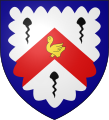|
Clan Russell
Clan Russell is a Scottish armigerous clan, with claimed origins in Normandy. It has ancestral ties to the English Dukes of Bedford, and has numerous descendants in Great Britain and America. HistoryOrigins of the clan Scottish author George F Black believed the surname Russell may be derived from roux which means red.[2] Other writers claim it to be derived from the Norman place name de Rosel. The name Rufus was commonly found among the Anglo-Normans (from Le Roux a nickname for someone with red hair).[2] Between 1164 and 1177 Walter Russel witnessed a charter in favour of Paisley Abbey.[2] Mentioned in a charter of about 1180 is John, son of Robert Russell of Duncanlaw.[2] In 1259 Robert Russell witnessed a deed relating to the lands of Threipland.[2] Wars of Scottish IndependenceIn 1296 Robert Russell appears on the Ragman Rolls giving homage to Edward I of England.[2] Historian William Anderson stated that the name of Russell came to Aberdeenshire with one Rozel who was an English baron who fought at the siege of Berwick and the Battle of Halidon Hill in 1333.[2] Rozel subsequently settled in Scotland and obtained the estate of Aden.[2] His family was styled 'Russell of that Ilk'.[2] 17th, 18th and 19th centuriesPatrick Russell was married to a sister of Archbishop Sharp and in 1680 he purchased the lands of Moncoffer in Banffshire. From him descend the Scottish Barons of Aden, Aberdeenshire.[2] The Russell of Ashiesteel family in Selkirkshire were particularly distinguished in military service.[2] Between 1756 and 1767 Colonel William Russel of Ashiesteel was adjutant general of the army of Madras and served under General Lord Clive.[2] His son was Major General Sir James Russel who also served in India and commanded a brigade of cavalry at the Battle of Mahidpur.[2] Alexander Russell was an eminent doctor and naturalist and in 1756 published a Natural History of Aleppo.[2] In England, another family, the descendants of Rufus became Dukes of Bedford.[2] The third son of the sixth Duke was John Russell who studied at the University of Edinburgh where he greatly admired the independent and democratic philosophy of the Scots.[2] In politics he was the architect of the first Reform Act 1832 and served as Prime Minister of the United Kingdom.[2] He was created Earl Russell in 1861.[2] His grandson was Bertrand Russell who was one of the great philosophers of the twentieth century.[2] Coats of Arms
Castles
References
|
||||||||||||||||||||||








